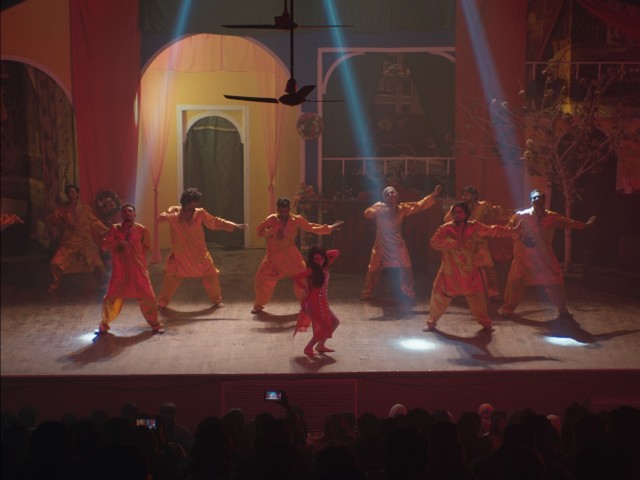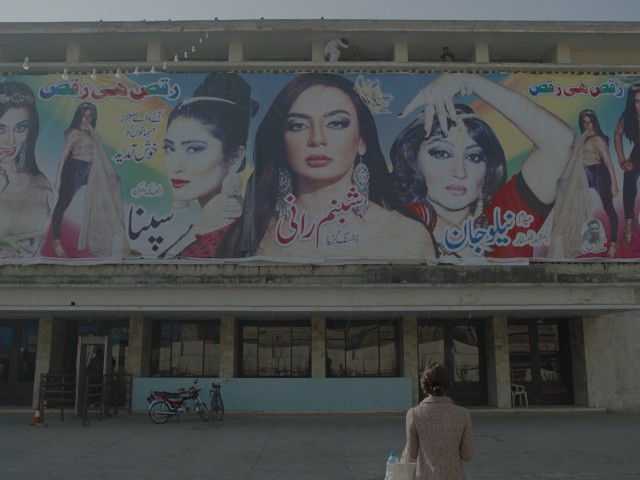When a young dancer (Alina) finally gets the chance to audition for a new show at an erotic dance theatre in Lahore, her big opportunity doesn’t exactly go to plan. As her friend Shani struggles with the feelings he has for her, she’s forced to make a tough decision to get what she wants. In his 16-minute short Darling, Writer/director Saim Sadiq transports us to Pakistan and introduces us to a facet of its culture, through a lens that celebrates this art form.
“An open secret in the otherwise repressive Pakistani society”
A moving narrative touching on some universal themes, Sadiq describes his film as “an exploration of masculinity and femininity set in a highly sexualised erotic dance subculture” – a form of entertainment the filmmaker describes as an “open secret in the otherwise repressive Pakistani society”. In its very nature, the film is not something one would expect out of Pakistan, which gives it an additional, refreshing taste.

The erotic dance theater setting is not one you typically associate with Pakistan
For authenticity purposes, Sadiq conducted extensive research into his subject, immersing himself in the subculture, experiencing it from both the audience and backstage. Not only is the setting unexpected, by showing a side of Pakistan most of us are not familiar with, Sadiq introduces us to this world (and the conversations surrounding it) through the experience of well-written, fleshed-out characters, who are faced with engrossing dilemmas.
“A coming-of-age story, a queer celebration, and a love letter to the Bollywood dream”
The narrative that Sadiq constructed also allows us to appreciate the story as a whole, but from different perspectives, “It is in equal parts a coming-of-age story, a queer celebration, and a love letter to the Bollywood dream”, he tells us while discussing the film. From Alina’s journey, accepting the sacrifices she will have to make to be on stage, to the story of Shani supporting her for who she is, even though he is not sure what to make of her decision, the narrative gives an extra nod to the cultural practices of its setting. All whilst confronting the characters to unique yet extremely relatable choices and seamlessly switching between perspectives.
Visually, the aesthetic of the film definitely complements those layers of appreciation. With long takes and carefully constructed frames, there is an immersive aspect to the film that contributes to its transportive quality – something that feels even more powerful under current circumstances. I mean who wouldn’t want to experience the frantic energy of live entertainment right now? Alina’s number, in particular, is visually gorgeous, from the colors to the choreography and the choice of lenses, it all combines to make that sequence so mesmerizing.

Alina (Alina Khan) arrives at the erotic dance theater in Lahore (Pakistan)
Darling would not be all it is without its titular character Alina Darling, portrayed by Alina Khan. For obvious reasons, the casting process was very important, prompting Sadiq and his crew to work with the Khawaja Sira Association (Trans Gender Association) of Lahore. Abdullah Malik’s performance as Shani also can’t go unmentioned though, as he brings a naivety and sensitivity to the film that contributes so much to its emotional impact. But Khan’s is what makes the film so captivating, she makes her character so easy to empathize with by genuinely revealing both her strength and vulnerabilities, making her choice all the more impactful for the audience.
Darling premiered at the 76th edition of the Venice Film Festival, where it was the first Pakistani film to ever be selected and won the Best Short Film award. It then went on to be selected at a multitude of festivals, including TIFF, SXSW and Palm Springs ShortFest, before being acquired by Focus Features. Sadiq is currently developing a miniseries for MakeReady LA and working on his first feature, Gulaab (based in the same universe as Darling), set to to be shot in 2021.

 Céline Roustan
Céline Roustan